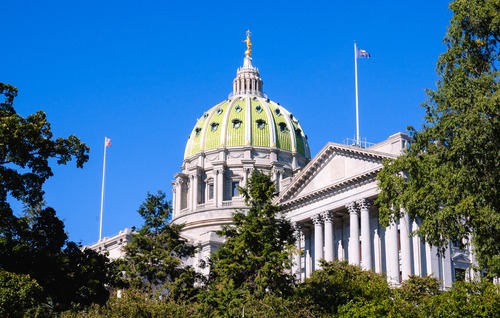
House Environmental Resources and Energy Committee Chairman Daryl Metcalfe (R-Butler) announced this week the committee’s approval to send a warning letter to the Regional Greenhouse Gas Initiative (RGGI) Board confirming Gov. Tom Wolf’s lack of authority to enter Pennsylvania into the agreement.
The committee voted on the letter at a meeting convened by Metcalfe on Tuesday.
“The Chairman of our Committee wrote to you when the governor was beginning this process to warn about accepting Pennsylvania’s entry based solely on the governor’s actions, which he has no authority to unilaterally take,” the committee wrote. “Since that time, our committee has held numerous hearings on the subject of RGGI where we have received testimony indicating that the governor has no statutory authority to join RGGI, and in fact, that attempting to do so will violate the Constitution of Pennsylvania.”
The committee members highlighted the fact that the General Assembly as well as industry groups across the state have repeatedly stated that participation in the RGGI without approval or input from the General Assembly is unconstitutional. Additionally, the members warned that board that any communications they have had with Wolf or the Department of Environmental Protection (DEP) asserting that Pennsylvania will be joining RGGI soon are illegitimate and should not be relied upon.
On Tuesday, the Wolf Administration announced a solidified plan to begin imposing a price on greenhouse gas emissions from power plants next year as dictated under RGGI participation. Specifically, the DEP final rule-making will enter the state into RGGI in January 2022, if approved by two state advisory boards this summer.
The DEP released Wednesday its Climate Impacts Assessment for 2021 in which federal, state and local data helps illustrate the trend of rising temperatures and increasing rainfall as the state approaches midcentury – defined as in the report as 2041-70 – without limiting greenhouse gas emissions.
Wolf first announced his intentions to join the initiative, which now boasts 11 states involved, in 2019.
“Every other state within RGGI received specific authorization to join the initiative from their legislature except for New York. Unlike Pennsylvania, however, New York’s legislature has specifically and explicitly authorized the regulation of carbon dioxide. Pennsylvania would be alone among the RGGI states if it proceeds without specific legislative authority for this rulemaking.”
The letter added that three DEP advisory committees – The Air Quality Technical Advisory Committee, the Citizens Advisory Council, and the Small Business Compliance Advisory Committee – all voted against approving the regulation involving Pennsylvania in RGGI.
The members specifically highlighted the Senate Republicans recent announcement that they will be rejecting all of the governor’s appointments made to the Pennsylvania Public Utility Commission until he withdraws his executive order attempting to join RGGI without legislative approval. They noted that the process will lead to a lengthy and expensive court battle within the state.